英语学习方法-疯狂英语成功故事九:夏鹏
疯狂英语学习方法
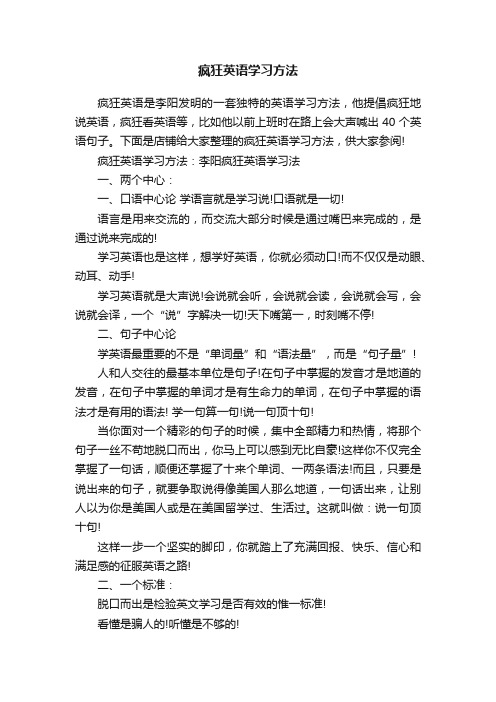
疯狂英语学习方法疯狂英语是李阳发明的一套独特的英语学习方法,他提倡疯狂地说英语,疯狂看英语等,比如他以前上班时在路上会大声喊出40个英语句子。
下面是店铺给大家整理的疯狂英语学习方法,供大家参阅!疯狂英语学习方法:李阳疯狂英语学习法一、两个中心:一、口语中心论学语言就是学习说!口语就是一切!语言是用来交流的,而交流大部分时候是通过嘴巴来完成的,是通过说来完成的!学习英语也是这样,想学好英语,你就必须动口!而不仅仅是动眼、动耳、动手!学习英语就是大声说!会说就会听,会说就会读,会说就会写,会说就会译,一个“说”字解决一切!天下嘴第一,时刻嘴不停!二、句子中心论学英语最重要的不是“单词量”和“语法量”,而是“句子量”!人和人交往的最基本单位是句子!在句子中掌握的发音才是地道的发音,在句子中掌握的单词才是有生命力的单词,在句子中掌握的语法才是有用的语法! 学一句算一句!说一句顶十句!当你面对一个精彩的句子的时候,集中全部精力和热情,将那个句子一丝不苟地脱口而出,你马上可以感到无比自豪!这样你不仅完全掌握了一句话,顺便还掌握了十来个单词、一两条语法!而且,只要是说出来的句子,就要争取说得像美国人那么地道,一句话出来,让别人以为你是美国人或是在美国留学过、生活过。
这就叫做:说一句顶十句!这样一步一个坚实的脚印,你就踏上了充满回报、快乐、信心和满足感的征服英语之路!二、一个标准:脱口而出是检验英文学习是否有效的惟一标准!看懂是骗人的!听懂是不够的!只有说出来才是自己的!能否脱口而出是检验是否学有所成的惟一标准!警惕自欺欺人的无谓牺牲和虚假进步!不达到脱口而出誓不罢休!语言就是脱口而出的艺术!不能脱口而出就不叫掌握语言!这是我们惟一的坚定信念和目标! 死活要脱口而出!三、三最口腔肌肉训练法:学习英语就是训练口腔肌肉!也就是我们所说的练嘴!因为英语是说出来的!只有经过疯狂训练,你的口腔肌肉才能轻松地发出陌生的外国声音,变成灵活的国际肌肉。
疯狂英语阅读:CharlottesWeb
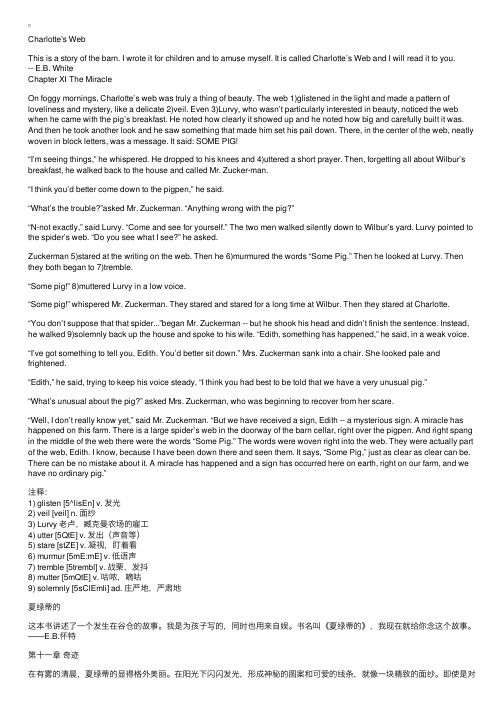
Charlotte's WebThis is a story of the barn. I wrote it for children and to amuse myself. It is called Charlotte’s Web and I will read it to you.-- E.B. WhiteChapter Ⅺ The MiracleOn foggy mornings, Charlotte’s web was truly a thing of beauty. The web 1)glistened in the light and made a pattern of loveliness and mystery, like a delicate 2)veil. Even 3)Lurvy, who wasn’t particularly interested in beauty, noticed the web when he came with the pig’s breakfast. He noted how clearly it showed up and he noted how big and carefully built it was. And then he took another look and he saw something that made him set his pail down. There, in the center of the web, neatly woven in block letters, was a message. It said: SOME PIG!“I’m seeing things,” he whispered. He dropped to his knees and 4)uttered a short prayer. Then, forgetting all about Wilbur’s breakfast, he walked back to the house and called Mr. Zucker-man.“I think you’d better come down to the pigpen,” he said.“What’s the trouble?”asked Mr. Zuckerman. “Anything wrong with the pig?”“N-not exactly,” said Lurvy. “Come and see for yourself.” The two men walked silently down to Wilbur’s yard. Lurvy pointed to the spider’s web. “Do you see what I see?” he asked.Zuckerman 5)stared at the writing on the web. Then he 6)murmured the words “Some Pig.” Then he looked at Lurvy. Then they both began to 7)tremble.“Some pig!” 8)muttered Lurvy in a low voice.“Some pig!” whispered Mr. Zuckerman. They stared and stared for a long time at Wilbur. Then they stared at Charlotte.“You don’t suppose that that spider...”began Mr. Zuckerman -- but he shook his head and didn’t finish the sentence. Instead, he walked 9)solemnly back up the house and spoke to his wife. “Edith, something has happened,” he said, in a weak voice.“I’ve got something to tell you, Edith. You’d better sit down.” Mrs. Zuckerman sank into a chair. She looked pale and frightened.“Edith,” he said, trying to keep his voice steady, “I think you had best to be told that we have a very unusual pig.”“What’s unusual about the pig?” asked Mrs. Zuckerman, who was beginning to recover from her scare.“Well, I don’t really know yet,” said Mr. Zuckerman. “But we have received a sign, Edith -- a mysterious sign. A miracle has happened on this farm. There is a large spider’s web in the doorway of the barn cellar, right over the pigpen. And right spang in the middle of the web there were the words “Some Pig.” The words were woven right into the web. They were actually part of the web, Edith. I know, because I have been down there and seen them. It says, “Some Pig,” just as clear as clear can be. There can be no mistake about it. A miracle has happened and a sign has occurred here on earth, right on our farm, and we have no ordinary pig.”注释:1) glisten [5^lisEn] v. 发光2) veil [veil] n. ⾯纱3) Lurvy ⽼卢,臧克曼农场的雇⼯4) utter [5QtE] v. 发出(声⾳等)5) stare [stZE] v. 凝视,盯着看6) murmur [5mE:mE] v. 低语声7) tremble [5trembl] v. 战栗,发抖8) mutter [5mQtE] v. 咕哝,嘀咕9) solemnly [5sClEmli] ad. 庄严地,严肃地夏绿蒂的这本书讲述了⼀个发⽣在⾕仓的故事。
李阳:我疯狂,我成功

【开场白】一个小男孩,从小就害羞自闭,连电话都不敢接,认为自己的人生一片灰暗,毫无光彩。
但是,长大以后,他不仅能讲一口流利的英语,还在全国200多座城市巡回演讲,让三千多万人跟随着他大声呐喊,学习英语。
说到这里,观众朋友们可能已经猜出他是谁了,他就是我们今天的嘉宾---“疯狂英语”的创始人李阳先生。
资料一:人物简介李阳, 1969年生,1986年考入兰州大学工程力学系。
1988年总结出一套独特的英语学习方法“疯狂英语”。
1990年,大学毕业后就职于西安西北电子设备研究所,1992年,因英语水平出色被调入广东人民广播电台英文台。
1994年,李阳辞去电台工作,创办李阳·克立兹国际英语推广工作室,全身心投入到“在中国普及英文、向世界传播中文”的事业。
李南:你好,李阳。
李阳:你好。
李南:你有好多的头衔和光环,其中有一个我们知道叫“英语口语教父”,“教父”感觉有点宗教的意味。
我想在国人学英语的浪潮一浪高过一浪的时候,一定要好好跟教父来交流沟通一下,首先展示一下大师的风采。
我们有时候开玩笑会说,你这英语怎么觉得像伦敦郊区,或者像纽约农民等等。
能不能找一句英语的简单的句子,然后用不同的方言,给我们展示一下不同英语风格是什么样子的?李阳:其实主要是两种英语,一种美国英语,一种英国英语。
美国英语相对更放松一点,举一个例子,最简单的一句“早上好”,美国人就会说Good morning,相对卷舌音重一点,放松一点,自信一点。
英国人刻板一点,Good morning,就好像嘴巴张得很小。
李南:很拘谨的样子,很绅士。
李阳:很拘谨,对。
然后除了这两种之外,剩下都是方言了,中国人说英语,Good morning。
印度人的英文在全世界也是很有特色的,我一般经常开玩笑,他们说one two three,印度人叫……,听不懂是什么意思。
新加坡英文也是难以入耳,日本英文就是thank you very much,日本人叫……。
英语学习方法-疯狂英语成功故事八: 金凌虹
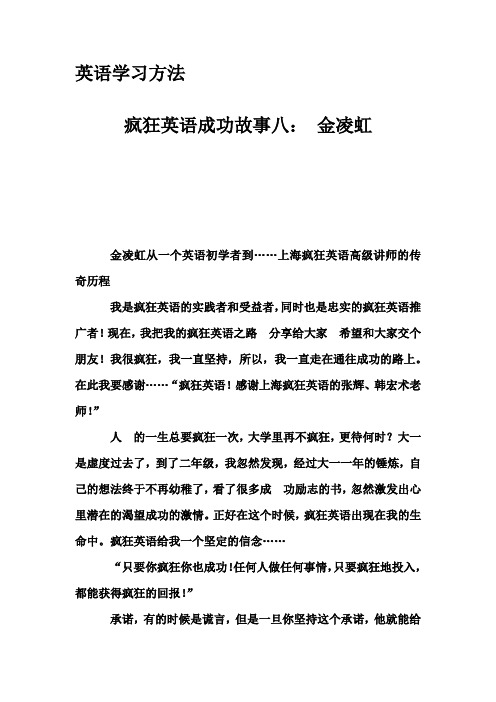
英语学习方法疯狂英语成功故事八:金凌虹金凌虹从一个英语初学者到……上海疯狂英语高级讲师的传奇历程我是疯狂英语的实践者和受益者,同时也是忠实的疯狂英语推广者!现在,我把我的疯狂英语之路分享给大家希望和大家交个朋友!我很疯狂,我一直坚持,所以,我一直走在通往成功的路上。
在此我要感谢……“疯狂英语!感谢上海疯狂英语的张辉、韩宏术老师!”人的一生总要疯狂一次,大学里再不疯狂,更待何时?大一是虚度过去了,到了二年级,我忽然发现,经过大一一年的锤炼,自己的想法终于不再幼稚了,看了很多成功励志的书,忽然激发出心里潜在的渴望成功的激情。
正好在这个时候,疯狂英语出现在我的生命中。
疯狂英语给我一个坚定的信念……“只要你疯狂你也成功!任何人做任何事情,只要疯狂地投入,都能获得疯狂的回报!”承诺,有的时候是谎言,但是一旦你坚持这个承诺,他就能给你带来无尽的回报!说到疯狂英语,我个人是有很深的感情的,因为我自己本身就是疯狂英语的实践者和受益者。
那我真正开始接触疯狂英语是在一年前。
疯狂英语的演讲……“实在太出色了!从此我就鬼迷心窍一样的迷上了疯狂英语。
”于是,我就开始尝试这种疯狂。
因为我以前英语不是很差,但也不是很好,每次考试基本上能考70分左右,口语基础基本上为零。
我以前从不知道英语还能拿来说的,我只知道英语是用来做对选择题的,至于和外国人交流真是连梦都没有做过的事。
那我当时是怎么学的呢,当时我选的是疯狂英语国际化中国人必备365句这个教材,那里面的句字呢都很简单,但是确实都很实用。
于是,我就把那些句子,全都抄在小卡片上,然后随身携带,一有空就拿出来读,从教室到寝室,从寝室到图书馆。
从图书馆到食堂,从新校区到老校区的路上,念念有词,也经常跑到教学楼的六楼楼顶疯狂地操练。
在林学院的操场上、东湖边、每条大路上、教学楼顶、山上到处留下了我疯狂的足迹。
结果我学了一个月,那些人还是理直气壮的打击我,每次我在教室里读英语,他们总是用那种审视精神病人的眼光看我。
英语学习方法-疯狂英语成功故事十二:陈大可

英语学习方法疯狂英语成功故事十二:陈大可自述——从中国式英语到“高级口语翻译和公司总裁”陈大可一个秋天的夜里,我在一个自习室里学习,忽然看到旁边的书桌上放着几张印刷漂亮的报纸,便拿过来看,发现题目是“疯狂英语在长春刮起风暴”,是一个英语学习方法在长春讲座的后继报道。
虽然只是那上面的几篇文字,几段方法的描述,之后的这一晚上,我被兴奋、期待、好奇、激动等一系列的情感字眼控制着,我忘记了我当时如何度过的……第二天,我就跑到书店里去,买了整整一大盒“疯狂英语套装”,迫不及待的读了起来……当我读完了全部的疯狂英语的方法,我马上在自己身上做试验。
以句子为中心来学习英语我从来没有试过,那天下午,我把自己关在一个没有人的水房里,使劲念几个比较拗嘴的句子,因为没有人,我可以把声音放得很大,发现越念越熟,越念越上口,虽然嗓子也越来越痛,但是发现越来越觉得自己有自信了。
那几个看似复杂冗长的句子,终于被我攻克了。
成了我可以在别人面前卖弄的外语绕口令。
随后的几天,我尝试着经常用这种方法学习外语,教室里,操场上,走廊里,到处都有我喊英语的身影,大家都觉得我很疯狂,我发现我开始对英语感兴趣了,它好像也不再那么神秘了。
可能这就是所谓的提高了自信吧。
有一天,老外Paul约我去他家玩,在和他闲聊的时候,他突然说:“Tony, pay much attention to your pronunciation, i t is very important.”(托尼,你一定要注意你的发音,这个在英语中很重要),我说:“啊?难道我的发音还有问题?”哈哈,真奇怪不是么,学了这么多年英语,从来没有人说我发音不好呢。
第二天下午,我独自来到了学校教学楼的后身,一个从来没有人来的地方,发誓一定要练好咬舌音。
我使劲的咬舌头——吐气,咬舌头——吐气,好难啊,我的舌头从来没有说话的时候伸出来一下的习惯,但是我拿出了疯狂英语中的口腔肌肉训练法,发狠似的狂喊狂练,一个下午,整整一个下午,水也没有喝一口,当我的嗓子已经痛得不行的时候,我轻易地发出了那两个标准的吐舌音。
李阳老师疯狂英语经典语录

李阳老师疯狂英语经典语录李阳老师疯狂英语经典语录李阳,英语口语教育家,疯狂英语创始人,提倡用大声重复诵读英语达到学习的方法。
李阳老师疯狂英语经典语录:Everyone is important.Anyone can change the word.No one should underestimate his power!人人都是重要的。
任何人都可以改变世界。
没有人应低估他自己的力量!Continuous efforts -- not strength or intelligence -- is the key to unlocking our potential.释放潜能的关键不是力量,也不是智慧,而是不断的努力。
The first law of success is concentration - to bend all the energies to one point,and to go directly to that point,looking neither to the right or to the left.成功的首要法则是聚焦!把所有的能量集中在一个点上!直击要害,不左也不右!Mistakes show us what we still need to learn.从错误中我们知道该学习什么。
It's impossible to defeat a person who never gives up!打败一个永不放弃的人是不可能的。
Keep believing in yourself and others will value and appreciate you.坚持相信自己,别人就会重视和欣赏你。
Positive energy brings magic and power with it.Yell English passionately to welcome the New Year!正面能量带有魔力!大喊英语迎接新年!Something must die in order to grow --your old habits,your old self image,your old thinking,your old life...must be weeded out for the seeds of success to grow.为了成长,某些东西必须消逝——为了让成功的种子成长,你的旧习惯、你的旧形象、你的旧思想、你的旧生活……都必须摈弃。
疯狂的英语
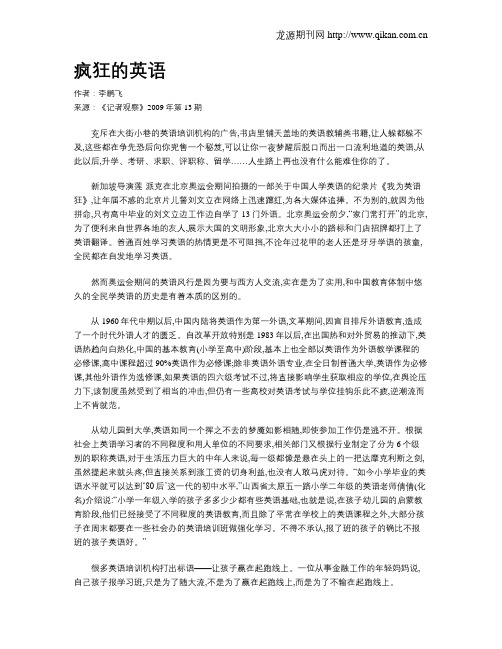
疯狂的英语作者:李鹏飞来源:《记者观察》2009年第13期充斥在大街小巷的英语培训机构的广告,书店里铺天盖地的英语教辅类书籍,让人躲都躲不及,这些都在争先恐后向你兜售一个秘笈,可以让你一夜梦醒后脱口而出一口流利地道的英语,从此以后,升学、考研、求职、评职称、留学……人生路上再也没有什么能难住你的了。
新加坡导演莲·派克在北京奥运会期间拍摄的一部关于中国人学英语的纪录片《我为英语狂》,让年届不惑的北京片儿警刘文立在网络上迅速蹿红,为各大媒体追捧。
不为别的,就因为他拼命,只有高中毕业的刘文立边工作边自学了13门外语。
北京奥运会前夕,“家门常打开”的北京,为了便利来自世界各地的友人,展示大国的文明形象,北京大大小小的路标和门店招牌都打上了英语翻译。
普通百姓学习英语的热情更是不可阻挡,不论年过花甲的老人还是牙牙学语的孩童,全民都在自发地学习英语。
然而奥运会期间的英语风行是因为要与西方人交流,实在是为了实用,和中国教育体制中悠久的全民学英语的历史是有着本质的区别的。
从1960年代中期以后,中国内陆将英语作为第一外语,文革期间,因盲目排斥外语教育,造成了一个时代外语人才的匮乏。
自改革开放特别是1983年以后,在出国热和对外贸易的推动下,英语热趋向白热化,中国的基本教育(小学至高中)阶段,基本上也全部以英语作为外语教学课程的必修课,高中课程超过90%英语作为必修课;除非英语外语专业,在全日制普通大学,英语作为必修课,其他外语作为选修课,如果英语的四六级考试不过,将直接影响学生获取相应的学位,在舆论压力下,该制度虽然受到了相当的冲击,但仍有一些高校对英语考试与学位挂钩乐此不疲,逆潮流而上不肯就范。
从幼儿园到大学,英语如同一个挥之不去的梦魇如影相随,即使参加工作仍是逃不开。
根据社会上英语学习者的不同程度和用人单位的不同要求,相关部门又根据行业制定了分为6个级别的职称英语,对于生活压力巨大的中年人来说,每一级都像是悬在头上的一把达摩克利斯之剑,虽然提起来就头疼,但直接关系到涨工资的切身利益,也没有人敢马虎对待。
夏鹏英语演讲稿
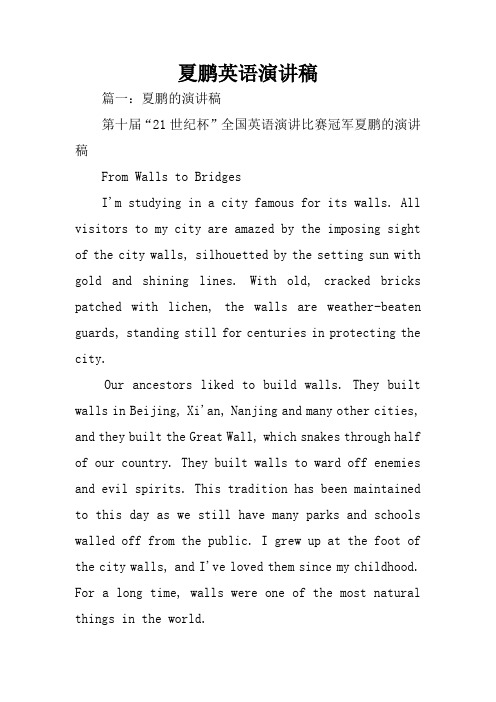
夏鹏英语演讲稿篇一:夏鹏的演讲稿第十届“21世纪杯”全国英语演讲比赛冠军夏鹏的演讲稿From Walls to BridgesI'm studying in a city famous for its walls. All visitors to my city are amazed by the imposing sight of the city walls, silhouetted by the setting sun with gold and shining lines. With old, cracked bricks patched with lichen, the walls are weather-beaten guards, standing still for centuries in protecting the city.Our ancestors liked to build walls. They built walls in Beijing, Xi'an, Nanjing and many other cities, and they built the Great Wall, which snakes through half of our country. They built walls to ward off enemies and evil spirits. This tradition has been maintained to this day as we still have many parks and schools walled off from the public. I grew up at the foot of the city walls, and I've loved them since my childhood. For a long time, walls were one of the most natural things in the world.My perception, however, changed after a hiking trip to the Eastern Suburbs, a scenic area of my city. My classmates and I were walking with some international students. As we walked out of the city, we found ourselves flanked by taller and taller trees, which formed a huge canopy above our heads. Suddenly an international student asked me, "Where is the entrance to the Eastern Suburbs""We're already in the Eastern Suburbs," I replied.He seemed taken aback, "I thought you Chinese have walls for everything." His remark set off a heated debate. At one point, he likened our walled cities to "jails," while I insisted that the Eastern Suburbs were one of the many places in China that had no walls.That debate had no winners, but I did learn a lot from this international student. For instance, he told me that universities like Oxford and Cambridge were not surrounded by walls; the campuses were just part of the cities. I have to admit that we do have many walls in China, and as we are developing our country, we must carefully examine them, whether they are physical or intangible. We will keep some walls but tear down thosethat impede China's development.Let me give you an example.A year ago, when I was working on a term paper, I needed a book on business law and found a copy in the law school library. However, the librarian turned down my request with a cold shoulder, saying, "You can't borrow this book, you are not a student here." In the end, I had to spend 200 yuan buying a copy; meanwhile, the copy in law school was gathering dust on the shelf. At the beginning of this semester, I heard that my university has started not only to unify its libraries but also link them up with libraries of other universities, so my experience will not be repeated. Barriers will be replaced by bridges. Through an inter-library loan system, we will have access to books from any library. With globalization, with China integrated into the world, I believe many of these intangible walls will be knocked down.I know globalization is a controversial issue, and it is hard to say whether it is good or bad. But one thing is for sure: it draws our attention to China's tangible and intangible walls and forces us to examinetheir roles in the modern world.And how about the ancient walls in my city and other cities Should we tear them down Just the opposite. My city, like Beijing and other cities, is actually making a great effort to preserve the walls. These walls attract not only historians and archeologists but also many schoolchildren trying to study our history and cultural heritage. Walls have turned into bridges to our past and to the rest of the world. If the ancient builders of these walls were still alive today, they would be proud to see such great change in the role of their walls. They are now bridges that link East and West, South and North, and all countries of the world. Our cultural heritage will survive globalization.篇二:第十届外研社杯英语演讲比赛夏鹏演讲文稿Thank you, ladies and gentlemen; my topic today is “Walls and Bridges”. I’m studying in a city famous for its city walls. All visitors to my city are amazed by the imposing sight of the city walls, silhouetted by the setting sun with gold and shining lines. With cold, cracked bricks patched with lichen. The walls are weather-beaten guards, standing still for centuries inprotecting the century. Our ancestors liked to build walls. They built walls in Beijing, Xi’an, Nanjing and many other cities and they built the Great Wall, which snakes through half of our country. They built walls to ward off the enemies and evil spirits. This tradition has been maintained to this day as we still have many schools and parks walled off the public. I grew up at the foot of the city walls and I have loving them since my childhood. For a long time, walls were one of the most natural things in the world. My perception changed after a hiking trip to the Eastern Suburbs, a scenic area of my city. My classmates and I were walking with some international students. As we walked out of the city, we found ourselves flanked by taller and taller trees, which formed a huge canopy above our heads. Suddenly an international student asked me, “where is the entrance to the Eastern Suburbs”“We’re already in the Eastern Suburbs,” I replied. He seemed taken aback. “I thought you Chinese have walls for everything.” His remark set off a heated debate. At one point, he likened our walled cities to “jails”, while I insisted that the Eastern Suburbs was one ofthe many places in China that had no walls. That debate had no winners, but I did learn a lot from this international student. For instant, he told me, universities like Oxford and Cambridge were not surrounded by walls. The campuses were just the part of the cities. I have to admit we do have many walls in China, and as we are developing our country, we must carefully examine them, whether they are physical or intangible. We will tear down some walls and we will keep some of them. Let me give you an example. A year ago, when I was working on a term paper, I needed a book on business law and I found a copy in the law school library. However, the librarian turned down my request with a cold shoulder, saying “you can’t borrow this book; you are not a student here.” In the end, I had to spend 200 yuan buying a copy; meanwhile the copy in the law school was gathering dust on the shelf. At the beginning of this semester, I heard that my university had started not only to unify all its libraries but also to link them up with other universities, so my experience will not be repeated. Barriers will be replaced by bridges. Through an inter-library loansystem, we will have access to any library. With globalization, with China integrated into the world, I believe many of these intangible walls will be knocked down. I know that globalization is a controversial issue, and it’s hard for us to say whether it is good or bad. But one thing is for sure, it draws our attention to China’s physical and intangible walls and forces us to examine their roles in the modern world. Then what about the walls in my cities and inother cities Should we tear them down Just the opposite. My city, like Beijing and other cities, is making great effort to preserve the walls. These walls now attracted not only historians and archaeologist but also our school children trying to study our history and cultural heritage. The walls have turned into bridges to our past and to the rest of the world. If the ancient builders of these walls were still alive today, they would be proud to see such a great change in the roles of their walls. They are now cultural bridges that link East and West, South and North, and all the countries of the world. Our cultural heritage will survive our globalization. Thank you very much,ladies and gentlemen.篇三:全国英语演讲赛冠军-夏鹏演讲稿Good afternoon, ladies and gentlemen:Today I would like to begin with a story. There was once a physical therapist who traveled all the way from America to Africa to do a census about mountain gorillas. These gorillas are a main attraction to tourists from all over the world; this put them severely under threat of poaching and being put into the zoo. She went there out of curiosity, but what she saw strengthened her determination to devote her whole life to fighting for those beautiful creatures. She witnessed a scene, a scene taking us to a place we never imaged we've ever been, where in the very depth of the African rainforest, surrounded by trees, flowers and butterflies, the mother gorillas cuddled their babies.Yes, that's a memorable scene in one of my favorite movies, called Gorillas in the Mist, based on a true story of Mrs. Diana Fossey, who spent most of her lifetime in Rwanda to protect the ecoenvironment there until the very end of her life.To me, the movie not only presents anunforgettable scene but also acts as a timeless reminder that we should not develop the tourist industry at the cost of our eco-environment.Today, we live in a world of prosperity but still threatened by so many new problems. On the one hand, tourism, as one of the most promising industries in the 21st century, provides people with the great opportunity to see everything there is to see and to go any place there is to go. It has become a lifestyle for some people, and has turned out to be the driving force in GDP growth. It has the magic to turn a backward town into a wonderland of prosperity. But on the other hand, many problems can occur - natural scenes aren't natural anymore. Deforestation to heat lodges are devastating Nepal. Oil spills from tourist boats are polluting Antarctica. Tribal people are forsaking their native music and dress to listen to U2 on Walkman and wear Nike and Reeboks.All these appalling facts have brought us to the realization that we can no longer stand by and do nothing, because the very thought of it has been eroding our resources. Encouragingly, the explosive growth ofglobal travel has put tourism again in the spotlight, which is why the United Nations has made XX the year of ecotourism, for the first time to bring to the world's attention the benefits of tourism, but also its capacity to destroy our ecoenvironment.Now every year, many local ecoenvironmental protection organizations are receiving donations - big notes, small notes or even coins - from housewives, plumbers, ambulance drivers, salesmen, teachers, children and invalids. Some of them cannot afford to send the money but they do. These are the ones who drive the cabs, who nurse in hospitals, who are suffering from ecological damage in their neighborhood. Why Because they care. Because they still want their Mother Nature back. Because they know it still belongs to them.This kind of feeling that I have, ladies and gentlemen, is when it feels like it, smells like it, and looks like it , it's all coming from a scene to be remembered, a scene to recall and to cherish.The other night, as I saw the moon linger over the land and before it was sent into the invisible, my mind was filled with songs. I found myself humming softly,not to the music, but to something else, someplace else, a place remembered, a place untouched, a field of grass where no one seemed to have been except the deer.And all those unforgettable scenes strengthened the feeling that it's time for us to do something, for our own and our coming generation.Once again, I have come to think of Mrs. Diana Fossey because it is with her spirit, passion, courage and strong sense of our ecoenvironment that we are taking our next step into the world.And no matter who we are, what we do and where we go, in our minds, there's always a scene to remember, a scene worth our effort to protect it and fight for it.Thank you very much.From Walls to BridgesI'm studying in a city famous for its walls. All visitors to my city are amazed by the imposing sight of the city walls, silhouetted by the setting sun with gold and shining lines. With old, cracked bricks patched with lichen, the walls are weather-beaten guards, standing still for centuries in protecting thecity.Our ancestors liked to build walls. They built walls in Beijing, Xi'an, Nanjing and many other cities, and they built the Great Wall, which snakes through half of our country. They built walls to ward off enemies and evil spirits. This tradition has been maintained to this day as we still have many parks and schools walled off from the public. I grew up at the foot of the city walls, and I've loved them since my childhood. For a long time, walls were one of the most natural things in the world.My perception, however, changed after a hiking trip to the Eastern Suburbs, a scenic area of my city. My classmates and I were walking with some international students. As we walked out of the city, we found ourselves flanked by taller and taller trees, which formed a huge canopy above our heads. Suddenly an international student asked me, "Where is the entrance to the Eastern Suburbs""We're already in the Eastern Suburbs," I replied.He seemed taken aback, "I thought you Chinese have walls for everything." His remark set off a heateddebate. At one point, he likened our walled cities to "jails," while I insisted that the Eastern Suburbs were one of the many places in China that had no walls.That debate had no winners, but I did learn a lot from this international student. For instance, he told me that universities like Oxford and Cambridge were not surrounded by walls; the campuses were just part of the cities. I have to admit that we do have many walls in China, and as we are developing our country, we must carefully examine them, whether they are physical or intangible. We will keep some walls but tear down those that impede China's development.Let me give you an example.A year ago, when I was working on a term paper, I needed a book on business law and found a copy in the law school library. However, the librarian turned down my request with a cold shoulder, saying, "You can't borrow this book, you are not a student here." In the end, I had to spend 200 yuan buying a copy; meanwhile, the copy in law school was gathering dust on the shelf.At the beginning of this semester, I heard that my university has started not only to unify itslibraries but also link them up with libraries of other universities, so my experience will not be repeated. Barriers will be replaced by bridges. Through an inter-library loan system, we will have access to books from any library. With globalization, with China integrated into the world, I believe many of these intangible walls will be knocked down.I know globalization is a controversial issue, and it is hard to say whether it is good or bad. But one thing is for sure: it draws our attention to China's tangible and intangible walls and forces us to examine their roles in the modern world.And how about the ancient walls in my city and other cities Should we tear them down Just the opposite. My city, like Beijing and other cities, is actually making a great effort to preserve the walls. These walls attract not only historians and archeologists but also many schoolchildren trying to study our history and cultural heritage. Walls have turned into bridges to our past and to the rest of the world. If the ancient builders of these walls were still alive today, they would be proud to see such great change in the role oftheir walls. They are now bridges that link East and West, South and North, and all countries of the world. Our cultural heritage will survive globalization 篇四:21世纪杯夏鹏演讲稿Building Bridges for the FutureI’m studying in a city that’s famous for its city walls. All visitors to my city are amazed by the imposing [im'puzi]sight of the city walls, especially when silhouetted [,silu:'et] by the setting sun with gold, shining lines. With old, cracked [krk] bricks are patched with lichen['laikn]青苔and the walls are weather-beaten饱经风霜的 guards standing still for centuries in protecting the city.Our ancestors liked to build walls. They built walls in Beijing, Xi’an, Nanjing and many other cities, and they built the Great Wall, which snakes[sneik]蜿蜒 through half our country. They built walls to ward off the enemies['enimi] and evil spirits恶魔. This tradition has been maintained to this day as we still have many parks and schools walled off from the public.For a long time, walls were one of the most natural things in the world to me.My perceptionsp'sepn] , however, changed after I made a hiking trip to the eastern suburbs ['sb:b] of my city. My classmates and I were walking with some international students. As we walked out of the city, we found ourselves flanked[flk] by tall trees, which formed a huge canopy['knpi] 遮篷above our heads. Suddenly an international student asked me, “Where is the entrance to the eastern suburbs”“We’re already in the eastern suburbs,” I replied. He seemed taken aback, “I thought you Chinese had walls for everything.” His remark set off a heated debate. At one point, he likened['laikn]比拟 our walled cities to “jails”, while I insisted that the eastern suburbs were one of the many places in China that had no walls.That debate had no winners, but I did learn a lot from this student. For instance, he told me that some major universities like Oxford['ksfd] and Cambridge ['keimbrid]were not surrounded by walls. I have to admit that we do have many walls in China, and as we develop our country, we must look carefully at them and decide whether they are physical or intangible [in'tndbl]无形的 . We will keep some walls but teardown those that impede our development.Let me give another example.A year ago, when I was working on a term paper, I needed a book on business law and found a copy in the law school library. However, the librarian coldly rejected my request to borrow it, saying, “You can’t borrow this book, you’re not a student here.” In the end, I had to spend 200 yuan to buy a copy. Meanwhile, the copy in the law school gathered dust on the shelf.At the beginning of this semester[si'mest] , I heard that my university had started to think of unifying its libraries and linking them to libraries at other universities, so my experience wouldn’t be repeated. Barrierswould be replaced by bridges. An inter-library loan 借出system would give us access to books from any library. With globalization and China integrated['intigreitid] into the world, I believe many of these intangible walls will be knocked down.I know that globalization is a controversial[,kntr'v:lissue, and it is hard to say whether it is good or bad. But one thing is for sure:it draws our attention to China’s tangible and intangible walls and forces us to examine[iɡ'zmin] their role in the modern world.And how about the ancient walls of mine and other cities Should we tear them down Definitely not. My city, like Beijing and other cities, is actually making a great effort to preserve [pri'z:v]the walls. These walls attract historians[his't:rin] , archaeologists [,ɑ:ki'ldist], and many schoolchildren who are trying to study our history and cultural heritage['heritid]. Walls have become bridges to our past and to the rest of the world. If the ancient builders of these walls were still alive today, they would be proud to see such great changes in the role of their walls. They are now bridges that link East and West, South and North, and all countries of the world. Our cultural heritage will survive globalization.篇五:英语比赛演讲稿历届全国英语演讲大赛冠军演讲稿第十一届“21世纪·澳门之星杯”全国英语演讲比赛冠军- 清华大学曹丰演讲稿 our future: a battle between dreams and reality good afternoon, ladies and gentlemen:when i was in theprimary school, i have a dream. i want to invent a device whichcould bring you from one place to another in no time at all. when i was in the secondaryschool, my dream was to study in my ideal university. and when eventually i got intothe university, my dream was to and gentlemen, the reality is not real. it is a barrier keeping us from all the possible fantasies. flying, for example, had been a dream to mankind forthousands of years. a hundred years ago, man could not fly was still regarded as thereality. now if that was really the reality, what did the wright brothers do howdid some of you get to macau only when we believe that the reality is not real canwe soar with our dreams. people say that our future is a battle between the reality and our dreams. andif, unfortunately, mr. reality wins this war, then i see no future of mankind at all.aids will never be curable as this is the reality;people living in the undevelopedcountries will suffer from starvation forever as this is the reality; 4) disputesamong different countries would never be settled as this misunderstandings andintolerance is the reality. ladies and gentlemen, how many of you have a dream of being able to make a lotof money please raise your hands. oh, quite a number of you! actually, ladies andgentlemen, this is not a dream, but a task. every one of us has to make a living,right anyway i hope your task 第十届“21世纪·外教社杯”全国英语演讲比赛冠军-南京大学夏鹏演讲稿from walls to bridges im studying in a city famous for its walls. all visitors to my city are amazed by the imposing sight of the city walls, silhouetted by the setting sun with goldand shining lines. with old, cracked bricks patched with lichen, the walls areweather-beaten guards, standing still for centuries in protecting the city. our ancestors likedto build walls. they built walls in beijing, xian, nanjingand many other cities, and they built the great wall, which snakes through half ofour country. they built walls to ward off enemies and evil spirits. this traditionhas been maintained to this day as we still have many parks and schools walled offfrom the public. i grew up at the foot of the city walls, and ive loved them sincemy childhood. for a long time, walls were one of the most natural things in the perception, however, changed after a hiking trip to the eastern suburbs, a scenic area of my city. my classmates and i were walking with some internationalstudents. as we walked out of the city, we found ourselves flanked by taller and tallertrees, which formed a huge canopy above our heads. suddenly an international studentasked me, where is the entrance to the eastern suburbs were already in the eastern suburbs, i replied.he seemed taken aback, i thought you chinese havewalls for everything. his remarkset off a heated debate. at one point, he likened our walled cities to jails, whilei insisted that the eastern suburbs were one of the many places in china that hadno walls.that debate had no winners, but i did learn a lot from this international student.for instance, he told me that universities like oxford and cambridge were notsurrounded by walls; the campuses were just part of the cities. i have to admit thatwe do have many walls in china, and as we are developing our country, we must carefullyexamine them, whether they are physical or intangible. we will keep some walls buttear down those that impede chinas篇二:3-5分钟英语演讲稿(30篇) 最好英语演讲稿汇总3——5分钟英语演讲稿汇总(30篇)六、周怡雪,19岁,上海i believe in our futurehonorable judges, fellow students:good afternoon!recently, ther is a heated debate in our society.the college students are thebeneficiaries of a rare privilege, who receive exceptional education atextraordinary places. but will we be able to face the challenge and support ourselves against all odds will we be able to better the lives of others will webe able to accept the responsibility of building the future of our country the cynics say we care for nothing other than grades; and we neglect the need for character cultivation. but again, the cynics are wrong. we care deeply for eachother, we cherish freedom, we treasure justice, and we seek truth. last week,thousands of my fellow students had their blood type tested in order to make acontribution for the children who suffer from blood college students, we are adolescents at the critical turning point in our lives.we all face a fundamental choice: cynicism or faith, each will profoundly impact ourfuture, or even the future of our country. i believe in all my fellow classmates.though we are still inexperienced and even a little bit childish. i believe that wehave the courage and faith to meet any challenge and take on our responsibilities.we are preparing to assume new responsibilities and tasks, and to use the educationwe have received to make our world a better place.i believe in our future.我对未来充满信心尊敬的评委,各位同学:下午好!最近,社会上有一场很激烈的争论。
- 1、下载文档前请自行甄别文档内容的完整性,平台不提供额外的编辑、内容补充、找答案等附加服务。
- 2、"仅部分预览"的文档,不可在线预览部分如存在完整性等问题,可反馈申请退款(可完整预览的文档不适用该条件!)。
- 3、如文档侵犯您的权益,请联系客服反馈,我们会尽快为您处理(人工客服工作时间:9:00-18:30)。
英语学习方法
疯狂英语成功故事九:夏鹏
采访——从听“疯狂英语演讲”到“21世纪杯”英语演讲比赛全国总冠军
今年4月,获得全国英语演讲比赛第一名,5月9日,代表中国远赴英伦与各国高手“对决”英语。
5月9日,南京大学英语夏鹏系大二年级的贵州籍学子夏鹏来不及给他远在贵阳的英语老师打个电话就匆匆踏上了飞往英国伦敦的航班,开始了他挑战世界顶尖英语演讲高手之路。
这次国际英语演讲比赛汇集了来自美国、英国、法国等数十个国家和地区的英语高手。
时间回到1996年,当时夏鹏还是我省平坝县境内黎阳厂子校的一名普通的小学五年级学生,父母对夏鹏的学业倾注了十分的心血,夏鹏一边在平坝黎阳厂子校读书,每一个星期还要从平坝坐两个小时的汽车赶到贵阳,在英语学校听两个小时的英语讲座后又一路颠回家,那个时候夏鹏还是一个个子很小的孩子,爸爸妈妈都要陪着他到贵阳。
百年英语学校的何讯老师至今还对夏鹏记忆犹新,每到夏天,小夏鹏总喜欢嘴里含着一支冰棍,见面第一句话总是“何老师好!”
当初有时候夏鹏一个星期要来两次贵阳,花费在路上的时间就
是8个多小时,一年下来,夏鹏为了学习英语花费在往返于平坝到贵阳这条路上的时间就有200个小时以上,六年的时间就是1000多个小时。
2000年,疯狂英语演讲来到……“贵州大学举办讲座,夏鹏亲自聆听了那场疯狂英语演讲。
夏鹏说那次讲座对他的影响极大……也是从那个时候开始,夏鹏完全爱上了英语演讲。
”
2001 年的时候,夏鹏的老师何讯在北京买回来一本英文版的《美国历史上最伟大的演讲》一书,夏鹏看到后,借去复印了厚厚的一本“印抄”。
何讯老师发现夏鹏是个学习英语的好苗子,于是将他和其他7名学生组成一个优生班,班上后来走出了2003年贵州省高考文科第一名、英语单科第一名的黄珊,还有后来考进清华大学高能物理系的朱迪等。
如今,当年优生班的几名同学都是所在大学的英语顶尖高手,有时候在全国高校英语演讲比赛中,大家还会不期而遇。
2003年,夏鹏以600分的高分考进南京大学法学院,后来又进入英语系本硕连读。
2004年CCTV全国英语演讲比赛中,夏鹏代表南京大学参加比赛,结果获得了第二名;
2005 年4月,“21世纪杯”全国英语演讲比赛在北京举行,夏鹏的演讲融激情与理性于一身,既提出了对郭敬明等青少年作家的思考,同时在回答来自美国等地的一流专家组成的评委提问时机智幽默,信心十足,极大调动了观众们的热情,掌声经久不息。
夏鹏获得了
演讲比赛冠军,同时获得“最具潜力奖”单项奖。
今年5月9日,夏鹏代表中国启程赴英国伦敦,他将在那里展示中国青年的英语演讲的风采。
